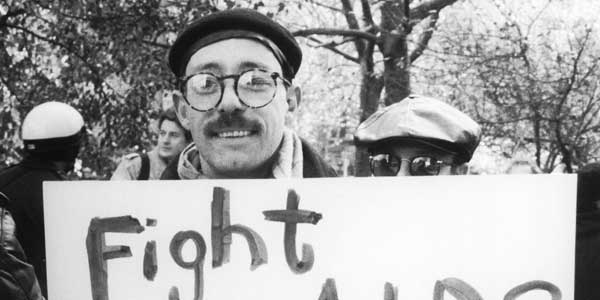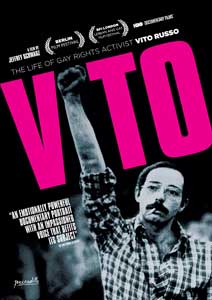
Director: Jeffrey Schwarz
Running Time: 93 mins
Certificate: E
Release Date: March 25th 2013

I often turn into an old man when it comes to most people’s knowledge of gay history, or rather their lack thereof. For many people there was Oscar Wilde, Stonewall and then somebody decided equal marriage would be nice, and that’s about it. You can kind of understand the ignorance, as LGBT history is so resolutely ignored in schools that you’d be forgiven for thinking there isn’t one, so anything that comes along to remind us it was a long, complex path to get us where we are is very welcome.
Vito is a documentary about Vito Russo, who you’re most likely to have heard of as the author of The Celluloid Closet, the seminal look at the history of homosexuality in film. However there was much more to him than that, as this film shows.
The documentary starts with his youth and how in the 1950s he first began seeking out other gay people. He then moved to New York in the pre-Stonewall era, when going to a gay bar brought the ever present danger of being rounded up by the police and arrested (and if people found out, your entire life could be destroyed). He witnessed the first Christopher Street riots (aka Stonewall) and while he didn’t participate in them, he saw the rise of gay consciousness and became an integral part of it. He helped organised protests, wrote extensively on gay issues and was one of the go-to guys if TV ever wanted someone gay to talk about issues affecting the community.
He also put together The Celluloid Closet as both a book and on-stage presentation, as well as presenting one of the very first gay TV shows on New York cable. If that weren’t enough, when AIDS emerged, be immediately went to the forefront of the fight, helping to found GLAAD (Gay & Lesbian Alliance Against Defamation) and ACT-UP (AIDS Coalition to Unleash Power). The first of those groups was set up to hit back against negative depictions of gay issues in the media, while the other was a vocal, direct action group designed to fight government inaction on AIDS, as well as other issues such as the perceived drug company profiteering when AZT was first marketed.
It was a particularly personal fight for Vito, who watched many friends die from the disease, including his lover, Jeffrey. Tragically he didn’t escape himself, living with the disease for several years before he died in 1990, aged 44. Despite his illness, he continued to fight and educate on gay issues and causes right up until the end.
He’s a fascinating man, and the fact that he was present for or adjacent to so many pivotal moments in modern gay history, allows the films to be a whistle-stop tour through much of the LGBT story in the US from the 1950s to the late 1980s. Seeing it through the eyes of one man makes the whole thing a lot more personal. Many of those who knew Vito are present to talk about him and his life. And because Vito was so vocal, there’s also plenty of interview footage with him for the documentary to draw on, allowing him to tell his story in his own words.
Admittedly it does have to rush through his life, simply because Vito was a very busy man who was involved in a lot of important and interesting things. However what the movie is good at is mixing the history and the personal, so that it almost becomes a series of fascinating but potted histories, inviting the viewer to go off and find out more themselves.
For example, it doesn’t just say he wrote The Celluloid Closet, it gives a short précis of the book’s entire thesis, complete with examples of the hidden homosexuality in classic films. Of course it can’t cover everything in five minutes, but it does a great job of showing why it’s such a fascinating subject (although as someone who runs a gay film blog, I have to admit that I am biased). You can then of course go off and find a copy of Russo’s book (which I’d heartily recommend, as it’s a great read), or indeed the 1995 documentary version.
The same is true of the Stonewall era, the emergence of AIDS and various other things Vito was involved with, where the documentary offers a starting point to show you how interesting and complex all this was.
Towards the end, Vito is very moving, giving a human face to the AIDS crisis. Even though it wasn’t that long ago, for those who grew up gay after the 80s it’s often difficult to believe what happened, and also the effect it had upon gay men only a few years older than them. The fear that erupted when gay men started dropping dead in their hundreds – especially when no one knew what was causing it – was immense, as shown here. And with Vito Russo being so involved, the documentary doesn’t just explore that era from a personal perspective, but also how it became such as important moment in gay rights history.
There are plenty of interesting nuggets, such as why there was such a backlash in the gay community to the idea that men should be more careful about sex after the emergence of AIDS. At the time, for many the ability to sleep with whoever you wanted, whenever you wanted was almost a political act. It was something gay people felt they’d had to fight for after years of repression. Finally they’d got to a point where they’d reached some sort of sexual liberation – despite strong oppression still being all around them – and now people were saying they’d have to give that up.
Overall Verdict: Vito is a very interesting documentary, covering some of the most important moments in modern gay history through the eyes of one of its most important and involved figures. It’s also a great starting point to get interested in gay history, from Stonewall and the emergence of AIDS, to gay representation in films.
Reviewer: Tim Isaac





Leave a Reply (if comment does not appear immediately, it may have been held for moderation)